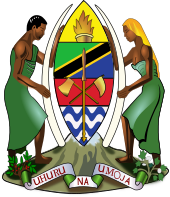| Tanzania Citizenship Act | |
|---|---|
 | |
| Parliament of Tanzania | |
| |
| Enacted by | Government of Tanzania |
| Status: Current legislation | |
Tanzanian nationality law is regulated by the Constitution of Tanzania, as amended; the Tanzania Citizenship Act, and its revisions; and various international agreements to which the country is a signatory.[1][2] These laws determine who is, or is eligible to be, a national of Tanzania.[3] The legal means to acquire nationality, formal legal membership in a nation, differ from the domestic relationship of rights and obligations between a national and the nation, known as citizenship. Nationality describes the relationship of an individual to the state under international law, whereas citizenship is the domestic relationship of an individual within the nation.[4][5] Commonwealth countries, including Tanzania, often use the terms nationality and citizenship as synonyms, despite recognising their legal distinction and the fact that they are regulated by different governmental administrative bodies.[4] For much of Tanzania's history racist policy curtailed domestic rights and nationality.[6] Tanzanian nationality is typically obtained under the principle of jus soli, i.e. by birth in the territory, or jus sanguinis, i.e. by birth in Tanzania or abroad to parents with Tanzanian nationality.[7][8] It can be granted to persons with an affiliation to the country, or to a permanent resident who has lived in the country for a given period of time through naturalisation.[9][10]
- ^ Manby 2016, pp. 32–34, 37, 136.
- ^ Nalule & Nambooze 2020, p. 22.
- ^ Manby 2016, pp. 6–7.
- ^ a b Fransman 2011, p. 4.
- ^ Rosas 1994, p. 34.
- ^ Nalule & Nambooze 2020, p. 1.
- ^ Manby 2016, pp. 47, 56.
- ^ Nalule & Nambooze 2020, p. 12.
- ^ Manby 2016, p. 94.
- ^ Nalule & Nambooze 2020, p. 13.